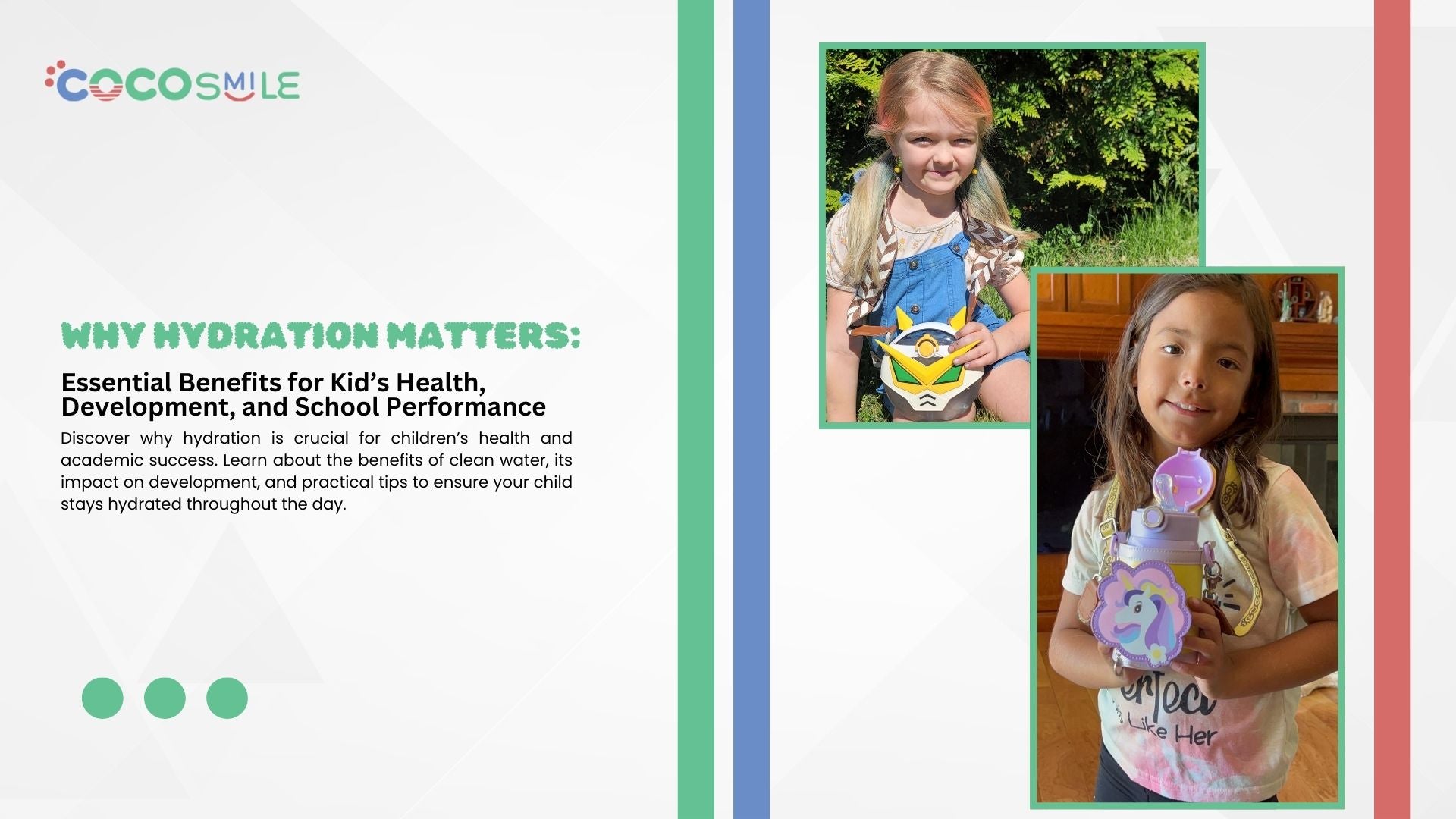"A simple glass of water might unlock your child's full potential."
Water is essential for every child's development. It’s not just a basic need; it plays a critical role in their growth, brain function, and overall well-being. Children need more water relative to their body weight than adults, as they are in continuous growth and development phases. Yet, many parents overlook the importance of keeping their children adequately hydrated.
This blog will explore:
- Why hydration is important
- The benefits of clean water
- Impact on development and education
- Practical strategies
The Health Benefits of Clean Water
Proper hydration is key to a child’s health. Clean water helps prevent diseases, supports digestion, and ensures proper nutrient absorption.
Disease Prevention
Clean water significantly reduces the risk of waterborne diseases such as diarrhea, cholera, and typhoid. These diseases can severely impact a child’s health, leading to malnutrition and growth delays. By drinking safe, clean water, children can maintain a stronger immune system, reducing their vulnerability to infections.
Nutritional and Digestive Benefits
Water is crucial for the body to function correctly. It transports essential nutrients like vitamins and minerals to the cells, helping in growth and development. Additionally, water aids in digestion, helping to prevent constipation, a common issue in children.
Impact of Hydration on Child Development
Hydration is vital for both physical and cognitive development in children. It affects growth, brain function, and body temperature regulation.
A. Physical Development
Water plays a significant role in physical growth. It helps in the absorption of nutrients necessary for development. Lack of water can lead to dehydration, which may cause stunted growth and other health issues.
B. Cognitive Development
The brain requires proper hydration to function optimally. Hydration supports learning, memory, and concentration, all crucial for academic performance. During periods of rapid brain development, water helps flush out toxins and ensures the brain receives essential nutrients and oxygen.
C. Regulation of Body Temperature
Children are more susceptible to temperature fluctuations. Water helps regulate body temperature, preventing overheating and supporting overall health.
Educational Outcomes and Clean Water
Access to clean water directly impacts a child's education. It influences attendance, academic performance, and gender equality in schooling.
A. School Attendance
When children have access to clean water, they are less likely to miss school due to waterborne illnesses. Regular attendance is critical for their educational development. For girls, clean water availability reduces the time spent fetching water, allowing more time for education.
B. Academic Performance
Hydration boosts cognitive functions like concentration and memory, leading to better academic performance. Schools with clean water access also provide a healthier environment for learning.
C. Gender Equality in Education
Access to clean water allows girls to focus on their studies instead of water-fetching duties. This promotes gender equality in education, giving girls equal opportunities to learn and succeed.
Practical Strategies to Ensure Proper Hydration
Ensuring children stay hydrated requires practical strategies that are easy to implement and follow.
A. Recognizing Dehydration in Children
It's crucial to recognize dehydration early. Signs include thirst, dry mouth, decreased urination, and fatigue. Severe dehydration needs prompt medical attention. Monitoring these signs helps parents take action before dehydration becomes severe.
B. Practical Methods to Increase Water Intake
Encouraging children to drink more water can be fun. Use Cocosmile cups to make drinking water enjoyable. These cups are not only attractive but also durable, making them perfect for children. Try using colorful straws, adding natural flavors like fruit, or incorporating water into playtime.
C. Avoiding Sweetened Beverages
Plain water should be the primary source of hydration for children. Sweetened beverages can lead to excessive sugar intake, discouraging them from drinking water. Educate your children about the importance of making best drinks and avoiding sugary drinks.
Social and Economic Impacts of Access to Clean Water
Access to clean water goes beyond health; it impacts community well-being and economic stability.
A. Community Health and Economic Stability
Communities with access to clean water experience fewer health issues, leading to increased productivity. Healthier children grow into healthier adults who contribute positively to society.
B. Empowerment and Awareness
Education about hygiene and sanitation is crucial. Schools can be platforms for teaching children the importance of clean water and proper hygiene practices, empowering them to make informed decisions for their health.
Key Interventions for Improving Access to Clean Water
Interventions to improve water access are essential for long-term health benefits.
A. Investment in Infrastructure
Building wells, pipelines, and purification systems ensures reliable access to clean water. This infrastructure is crucial for sustaining healthy communities.
B. Education and Training
Community education on maintaining water systems and practicing good hygiene is vital. Training programs can help communities take ownership of their water resources.
C. Policy and Advocacy
Advocating for water access as part of public health agendas is essential. Policies should prioritize clean water infrastructure and ensure that resources are allocated effectively.
Conclusion
Hydration is essential for children’s health, development, and education. Ensuring access to clean water and encouraging healthy drinking habits sets the foundation for a healthier, more educated future. By investing in clean water infrastructure and promoting awareness, we can make a significant impact on the well-being of children and their communities.
FAQs
Do kids only need to drink water when they’re thirsty?
No, thirst is a late sign of dehydration. Children should drink water regularly throughout the day, even if they don’t feel thirsty, to stay properly hydrated.
Do juice and milk count as water intake?
While juice and milk do contribute to fluid intake, water is the best choice for hydration. These other beverages can contain sugars or additives that aren’t ideal for maintaining proper hydration.
Do children get enough water from food alone?
No, although fruits and vegetables contain water, they aren’t sufficient to meet daily hydration needs. Regular water consumption is essential for maintaining proper hydration.
Is dehydration only a concern in hot weather?
No, dehydration can occur in any weather, particularly if a child is active or unwell. It’s important to ensure adequate water intake throughout the year.
No, consistent hydration throughout the day is crucial. Children should drink water regularly, including during school hours, to stay focused and energetic.


Share:
Hydration Hacks for Young Athletes: Master the Balance for Peak Performance
How to Keep Your Child Hydrated When Sick: Essential Tips for Parents